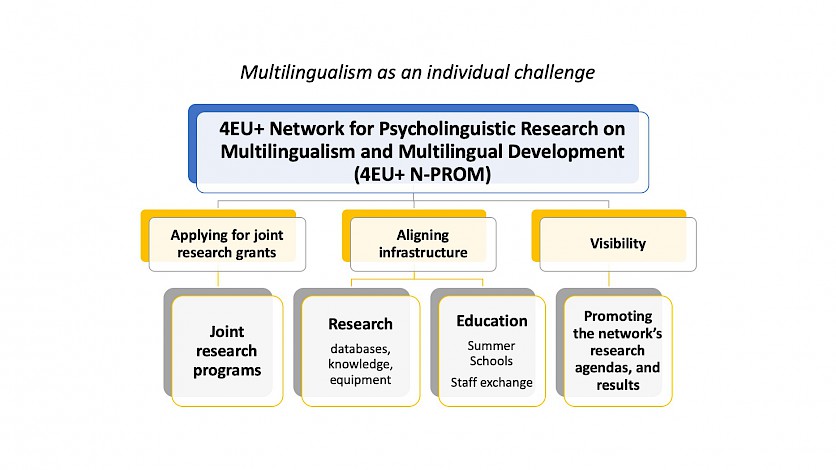European Network for Psycholinguistic Research on Multilingualism and Multilingual Development (4EU+ N-PROM)
The European Network for Psycholinguistic Research on Multilingualism and Multilingual Development was founded as part of the 4EU+ European University Alliance.
Visions and missions
Visions
Multilingualism is a reality in modern-day Europe. This brings tremendous opportunities, but also daunting challenges. The network seeks to provide a better understanding of the mechanisms underlying multilingual functioning at the level of the individual. By combining the network partner’s expert knowledge of the main European language families (Romance, Slavic and Germanic languages), and their expertise in psychology and linguistics, the network will give the much needed scientific answers to the challenges experienced by individuals and the European society, and allow policy makers to adequately respond to the challenges linked to multilingualism.

Missions
First, we strengthen the network by sharing resources and knowledge among current partners and by engaging additional partners from the 4EU+ alliance. Second, we set up an infrastructure for the training of young researchers associated with the network (e.g., “The flying summer school for research methods in language and cognition”). Third, we refine existing methods for the measurement and comparison of multilingual competence across languages, ages and settings. In the process, we will combine psycholinguistic experiments (e.g., laboratory) with research in natural and educational settings (e.g. classrooms). Fourth, we seek to acquire the funding necessary to fulfil our research goals. Fifth, we disseminate and communicate the ideas and outcomes acquired.
Representatives of the network's partner instittutions
- Heidelberg University Language & Cognition Lab - Dr. Johannes Gerwien
- Institute of English Studies, Applied Linguistics, University of Warsaw - Dr. Agnieszka Otwinowska-Kasztelanic
- Faculty of Psychology, University of Warsaw - Dr. Ewa Haman
- Institute of Psychology, Academy of Sciences of the Czech Republic, Charles University, Prague - Dr. Filip Smolik, Dr. Nikola Paillereau